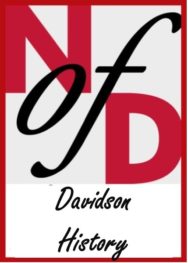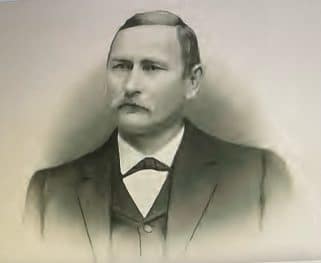NEWS
Professor William D. Vinson, “One of the Brainiest Men in the South”
 On August 25, 1897, Davidson College lost Professor William D. Vinson who, despite his relatively brief tenure at the college, was sorely missed by town and gown. Vinson was born in South Carolina in April 1849. In 1850, he was living in Richland County with his parents, Andrew P. and Anna J. Vinson, and his four siblings. Andrew was a wealthy planter. Vinson’s mother died in 1851 and his father in 1852, leaving him an orphan. In 1860, he was eleven years old and was living in Abbeville County, South Carolina, with Reverend William W. Gwin and his wife Sarah. He attended school in Chester, and toward the end of the Civil War, he enlisted in the Confederate army, but never saw action.
On August 25, 1897, Davidson College lost Professor William D. Vinson who, despite his relatively brief tenure at the college, was sorely missed by town and gown. Vinson was born in South Carolina in April 1849. In 1850, he was living in Richland County with his parents, Andrew P. and Anna J. Vinson, and his four siblings. Andrew was a wealthy planter. Vinson’s mother died in 1851 and his father in 1852, leaving him an orphan. In 1860, he was eleven years old and was living in Abbeville County, South Carolina, with Reverend William W. Gwin and his wife Sarah. He attended school in Chester, and toward the end of the Civil War, he enlisted in the Confederate army, but never saw action.
In 1869, Vinson received a scholarship to Washington and Lee College in Virginia, where he earned both a B.A. and an M.A. He was an excellent student, winning medals in Latin, Greek, and mathematics. Then-president Robert E. Lee reportedly said that “Vinson has the finest mathematical mind I have ever known.” He taught Greek at Washington and Lee for two years, and then he went to teach at Waco Female College in Texas. From there, he went to teach math at Austin College in Sherman, Texas. In 1883 he accepted the chair of the department of mathematics at Davidson. At the time the Raleigh News and Observer reported that Vinson was “an energetic and ambitious worker,” and had a “wonderful magnetic influence over young men.”

Professor William D. Vinson
In August of the following year, at the age of 35, he married Lillie Helper, daughter of H.P. Helper of the Helper Hotel, and the following year they moved into the Chairman Blake House, then located on South Main Street. Professor Vinson was a man of wide-ranging interests. In addition to math and classical languages, he sometimes taught German and French during the summer vacations. In his later years, he became interested in economics, sociology, and political science.
Walter Lingle, in his Memories of Davidson College, noted that Vinson “had as much of what Scotsmen call primordial brain power as any man I ever knew. He had a remarkable mind both as to memory and reasoning power.” Vinson based his teaching on that of Mark Hopkins, longtime philosophy professor and president of Williams College. Hopkins used the Socratic method, and Lingle noted that “In quizzing his students [Vinson] was not satisfied with an answer from the textbook. ‘What do you say?’ was his standing question. He taught his students to think.”
In addition, Vinson had an excellent memory for things that he had read or heard. According to an August 29, 1897 obituary in the Wilmington Messenger, this provided him with “a rich store of information and incident from which to draw at all times and … made him an unusually interesting conversationalist and exceedingly interesting…lecturer, both in the classroom and before the public.”
According to one of his colleagues, William Currell, he also possessed “an enthusiasm at times well-nigh overpowering…[and] a picturesque and copious vocabulary.”
Vinson, however, suffered from poor vision which hampered him in his teaching. According to former student, writing in The Watchman and Southron after his death, “Prof. Vinson’s eyes were so bad that he could not read the largest type without the aid of a strong magnifying glass. He had consequently to rely greatly upon his memory, and what a memory it was! The subject that he taught – Mathematics – was one that fortunately required little reading and he had never to open a text-book in class. All students of his will remember a scene of this kind: a student reading examination papers while Prof. Vinson with his knife as sharp as a razor whittled white pine boards that his students provided for him; but while he whittled he listened: nothing escaped him…In addition to mathematics Prof. Vinson requested the faculty to let him have the chair of economics, and his lectures on the subject of political economy were a delight to his students. His method of preparing these lectures is interesting … he could read but little and when he wished to prepare a lecture he took his strong magnifying glass, noted in his text-book the subject of the lesson, glanced down the pages and saw the heads of the different paragraphs. He then took his hoe and went into his garden. When he struck the last lick his lecture was crystalized and it was sure to charm his auditors.”
A Davidson colleague noted that Vinson was such a good teacher that “When a boy doesn’t get into his pate a gallon of Mathematics, it is simply because the poor fellow’s cranium holds only quart.” According to Cornelia Shaw’s history of the college, Vinson rarely missed his classes, and after his first ten years at Davidson his affectionate students would joke that “Old Vinse never gets sick and never goes anywhere.”
In addition to admiring Vinson for his mental prowess, his students held him in great affection. In 1897, the students voted him both their most intellectual and their most popular professor. In 1898, following his death, they dedicated the yearbook to his memory, calling him great in intellect, in courage, affection and integrity.”
A former student, writing after Vinson’s death, noted that the students’ love for him was evidenced in “the endearing term of ‘Old Vinse’…nothing could be more expressive of mixed veneration and love as it was used among students on campus. If the boys as a body ever got into trouble and their deliberations produced no plan of action the unanimous expression was always: ‘Let’s go to see ‘Old Vinse’ and they were never disappointed.”
“Old Vinse” was equally admired in the town of Davidson. In her history of the college, Mary Beaty reports that he was “an unusually genial person [who] was also direct and clearminded, with no use for sham.” Cornelia Shaw notes that he was “a man of high principal” who detested “anything mean and low.” Walter Lingle described him as “deeply religious but as free from cant as any man I have ever known.” In its August 29 obituary, the Wilmington Messenger described him as “affable in manner” and “easy of approach,” a man who would be missed because of his “many kindly virtues.”
By the summer of 1897, Vinson, while still performing his duties, had been in declining health for some time. He suffered from heart trouble, and in mid-summer, he had a serious attack that almost killed him. He rallied from that, but he died early on the morning of August 25. The Daily Concord Standard, responding to his death, wrote that he was considered “one of the brainiest men of the South.” One former student described him as “a good, well-loved, helpful, versatile, ambition-inspiring friend,” and another reported that as “[he looked] back over the list of teachers under whom I sat, he stands apart from all the others, like some towering, rugged mountain peak, standing apart from the rest of the chain.”
A former student, writing in the Watchman and Southron on August 25, penned what is perhaps the most eloquent epitaph for “Old Vinse”: “wherever there is a student of Davidson College you will find a living monument to the memory of Prof. W.D. Vinson. He chose that his epitaph should be written on the fleshy tablets of his students’ hearts and he chose well; for no epitaph inscribed on marble could be more flattering or sincere.”
William Vinson’s family would continue to have an influence in Davidson for many years. For some years his widow ran a student boarding house in the home now known as the Copeland House. The Vinsons had two children, one of whom, Porter Perry Vinson, became a well-known doctor. His daughter, Maude, according to Mary Beaty, showed the “same power of intellect and enthusiasm of spirit which had distinguished her father.” She used these skills in her decades-long teaching career, teaching French and math to innumerable high school students in Davidson.
Nancy Griffith
Nancy Griffith lived in Davidson from 1979 until 1989. She is the author of numerous books and articles on Arkansas and South Carolina history. She is the author of "Ada Jenkins: The Heart of the Matter," a history of the Ada Jenkins school and center.


